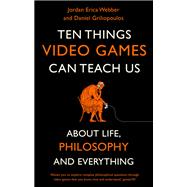WOULD YOU KILL ONE PERSON TO SAVE FIVE OTHERS?
If you could upload all of your memories into a machine, would that machine be you? Is it possible we're all already artificial intelligences, living inside a simulation?
These sound like questions from a philosophy class, but in fact they're from modern, popular video games. Philosophical discussion often uses thought experiments to consider ideas that we can't test in real life, and media like books, films, and games can make these thought experiments far more accessible to a non-academic audience. Thanks to their interactive nature, video games can be especially effective ways to explore these ideas.
Each chapter of this book introduces a philosophical topic through discussion of relevant video games, with interviews with game creators and expert philosophers. In ten chapters, this book demonstrates how video games can help us to consider the following questions:
1. Why do video games make for good thought experiments? (From the ethical dilemmas of the Mass Effect series to 'philosophy games'.)
2. What can we actually know? (From why Phoenix Wright is right for the wrong reasons to whether No Man's Sky is a lie.)
3. Is virtual reality a kind of reality? (On whether VR headsets like the Oculus Rift, PlayStation VR, and HTC Vive deal in mass-market hallucination.)
4. What constitutes a mind? (From the souls of Beyond: Two Souls to the synths of Fallout 4.)
5. What can you lose before you're no longer yourself? (Identity crises in the likes of The Swapper and BioShock Infinite.)
6. Does it mean anything to say we have choice? (Determinism and free will in Bioshock, Portal 2 and Deus Ex.)
7. What does it mean to be a good or dutiful person? (Virtue ethics in the Ultima series and duty ethics in Planescape: Torment.)
8. Is there anything better in life than to be happy? (Utilitarianism in Bioshock 2 and Harvest Moon.)
10. How should we be governed, for whom and by who? (Government and rights in Eve Online, Crusader Kings, Democracy 3 and Fable 3.)
11. Is it ever right to take another life? And how do we cope with our own death? (The Harm Thesis and the good death in To The Moon and Lost Odyssey.)








